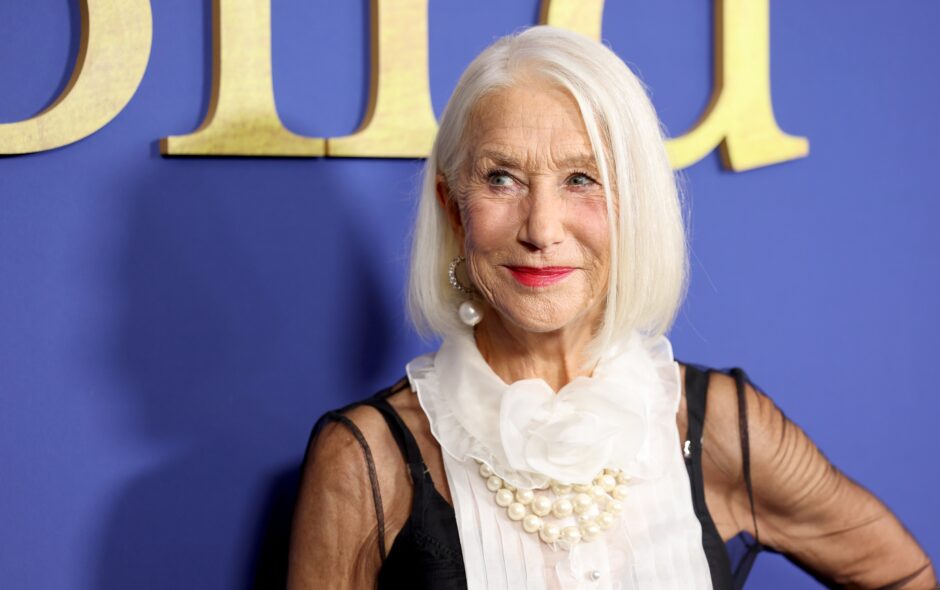Helen Mirren has weighed in on one of the longest-running debates in modern cinema: whether James Bond could, or should, be played by a woman. Speaking to Saga magazine while promoting her upcoming Netflix film The Thursday Murder Club, Mirren said she believed that the character should remain male, even though she considers herself a feminist.
“I’m such a feminist, but James Bond has to be a guy,” she said. “You can’t have a woman. It just doesn’t work. James Bond has to be James Bond, otherwise it becomes something else.”
Mirren’s comments came during a joint interview with Pierce Brosnan, who played Bond in four films between 1995 and 2002. The two are co-starring in The Thursday Murder Club, a mystery comedy in which Mirren plays Elizabeth, a retired spy who joins a group of friends in solving murders. She contrasted her new role with the exaggerated, almost mythical qualities of Ian Fleming’s superspy.
“So many women have worked in that world,” she said, referring to espionage. “Elizabeth is a manifestation of a reality, that’s for sure—but not so much fun as Bond.”
Brosnan backed her up, saying he was looking forward to seeing who would inherit the tuxedo after Daniel Craig’s departure. “I’m so excited to see the next man come on the stage and to see a whole new exuberance and life for this character,” he told the magazine.
The remarks reflect a larger cultural conversation that has followed the Bond franchise for years. Each time a new actor is set to be chosen, speculation grows about whether the producers might break tradition. Some fans and commentators have called for a female 007, pointing to evolving cultural attitudes and a desire for more diversity in one of cinema’s most enduring franchises. Others, like Mirren, have argued that the role’s long-established identity is deeply tied to its masculinity.
Mirren’s view is not new. Earlier this year, she described the Bond films as “born out of profound sexism” but suggested that rather than recasting the role as a woman, Hollywood should focus on developing original stories about female spies. She noted that there are many extraordinary real-life examples of women who worked in intelligence, from World War II resistance fighters to Cold War operatives, who could inspire compelling new characters.
The actress’s own career offers an example of how women have already reshaped the Bond universe. Judi Dench’s casting as M in 1995, coinciding with Brosnan’s debut in GoldenEye, marked one of the most significant gender shifts in the series. Dench’s performance redefined the role of Bond’s superior, and she remained a central figure through Craig’s tenure. Mirren herself played a wryly authoritative version of M in a comic sketch years later, further underscoring her connection to the franchise’s legacy.
For Brosnan, the emphasis was less on who plays Bond and more on ensuring the role continues to evolve. During his own time in the tuxedo, the franchise modernized Bond’s image while still holding fast to the suave traditions established by Sean Connery and Roger Moore. “Bond has always been about change,” he said. “Each actor brings his own style, his own take, but it still has to be Bond.”
Their joint comments underscore the delicate balance facing the producers at Eon Productions. Daniel Craig’s departure in 2021 left the role vacant, and speculation has swirled about who might step in. Names such as Idris Elba, Henry Cavill, and Aaron Taylor-Johnson have circulated as possible contenders. What is clear from Mirren and Brosnan’s remarks is that they expect the role to remain male, though both left the door open for new stories built around strong female characters in the spy genre.
For Mirren, the key lies in honoring tradition without stifling progress. “Bond has to be Bond,” she said simply. “But that doesn’t mean there isn’t room for new heroes.”
The Thursday Murder Club, starring Helen Mirren and Pierce Brosnan, premieres on Netflix on August 28.
Would you like me to also add a short sidebar profile on Mirren herself—her career longevity, Oscar win, and reputation as a boundary-breaking actress—as a companion piece to this article?




